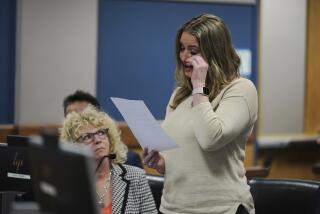Lawyer Guilty of Aiding Terrorists
NEW YORK — In a case with broad implications for civil liberties and America’s war on terrorism, an outspoken civil rights lawyer and two colleagues were convicted Thursday of conspiring to smuggle information to an imprisoned Egyptian cleric, and of helping him communicate incendiary messages to terrorists around the world.
After 13 days of deliberations, a federal jury convicted lawyer Lynne F. Stewart on charges of giving material support to international terrorists and making false statements to the U.S. government. She faces as much as 20 years in prison.
U.S. Atty. Gen. Alberto R. Gonzales praised the verdicts, saying they sent a “clear, unmistakable message that this department will pursue both those who carry out acts of terrorism and those who assist them with their murderous goals.”
The case grew out of Stewart’s representation of Sheik Omar Abdel Rahman, who was convicted in 1995 of plotting to blow up the United Nations, the Lincoln and Holland tunnels and other New York landmarks.
She was accused of smuggling a letter to her client that asked him to use his influence to oppose a cease-fire between Egypt and militant groups -- and then relaying his views to the media.
Stewart, 65, promised to appeal. “I know I committed no crime,” she said. “I know what I did was right.” She remained free on bail pending a July 15 sentencing hearing.
Also convicted was U.S. postal worker Ahmed Abdel Sattar, who could face life in prison for conspiring to “kill and kidnap persons in a foreign country” by publishing a statement calling for the murder of Jews and their supporters.
Arabic translator Mohammed Yousry faces 20 years in prison for providing support to terrorists.
When the verdicts were read, Stewart shook her head and tears began streaming down her face. Some of her supporters in the Manhattan courtroom cried out in disbelief. A group of supporters began chanting “Free Lynne Stewart” as she walked out of the courthouse.
The convictions represented a major victory for the Department of Justice, which had made the case a centerpiece of its national anti-terrorism campaign. In July 2002, U.S. Atty. Gen. John Ashcroft singled Stewart out in announcing the indictments. He said she had brazenly attempted to help her client wage an international terrorist campaign from prison.
But civil liberties experts warned that the case represented a dangerous attack on the rights of lawyers to represent their clients and an erosion of the attorney-client privilege that could prevent other lawyers from representing unpopular figures.
“We have all in our lifetimes seen well-meaning juries get caught up in the media-dominated government rhetoric of their time, based mostly on fear,” said Michael Tigar, Stewart’s lawyer, after the verdicts were announced. “I do not criticize these jurors.... I have every confidence this verdict will be set aside.”
The heart of the government’s case focused on a visit Stewart made five years ago to her client, Abdel Rahman, in a federal prison in Minnesota. She was required to sign “special administrative measures” drawn up by the Justice Department that barred her from smuggling in terrorist-related materials to him, or communicating his views and political pronouncements, either to other terrorists or through the media.
During the seven-month trial, Stewart conceded that she brought Abdel Rahman a message in Arabic from Sattar, the sheik’s paralegal. The letter conveyed a message from Rifai Taha, a leader of the Islamic Group, which has been identified as a terrorist group based in Egypt.
In the letter, Taha urged Abdel Rahman to use his influence to oppose a cease-fire in Egypt between the government and terrorist organizations.
After the meeting, Stewart contacted a Reuters correspondent and told the reporter about the sheik’s statements opposing the cease-fire. She said she was simply keeping her client “visible” and working to have him transferred from the U.S. to an Egyptian prison.
Tigar had also argued that the meaning of the guidelines was unclear, and that Stewart acted in good faith when relaying her client’s views to a journalist.
But government lawyers contended that the actions in prison showed Stewart’s “utter contempt” for the federal guidelines. They said she used her visits to Abdel Rahman as a cynical “cloak” to cover up support for terrorist activities overseas.
Experts disagreed about the meaning of the verdicts.
Michael Ratner, president of the Center for Constitutional Rights, said the government had prosecuted Stewart for political reasons.
The overriding goal of the case, he suggested, “was to send a message to lawyers who represent alleged terrorists that it’s dangerous to do so.”
But Steven Lubet, professor and director of the Program on Advocacy and Professionalism at Northwestern University School of Law, was skeptical of Stewart’s claim that she was simply doing her job as a lawyer.
James Cohen, a criminal law professor at Fordham Law School, said: “I don’t think this verdict will discourage potential defense attorneys in the future from taking on widely unpopular clients, because what she did was outside of a lawyer’s role.”
*
Times staff writer Henry Weinstein in Los Angeles contributed to this report.
More to Read
Sign up for Essential California
The most important California stories and recommendations in your inbox every morning.
You may occasionally receive promotional content from the Los Angeles Times.










